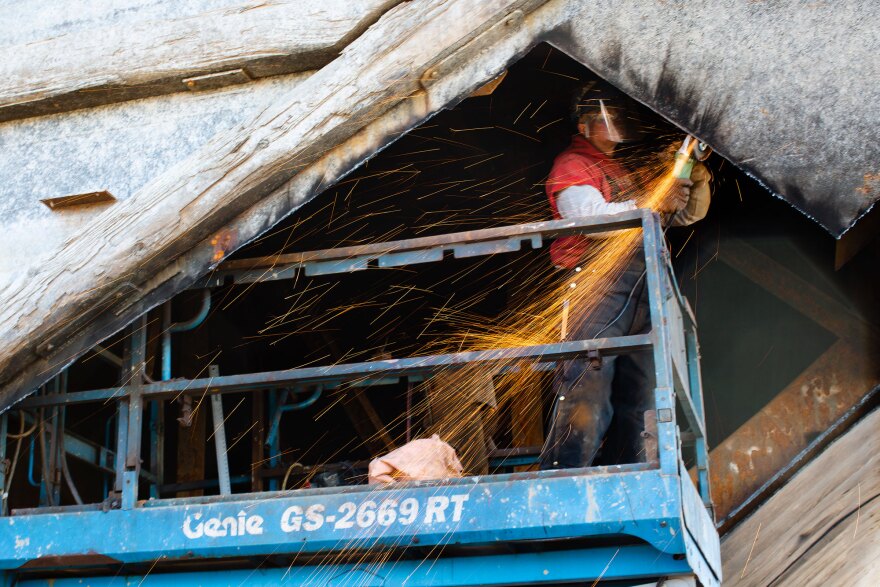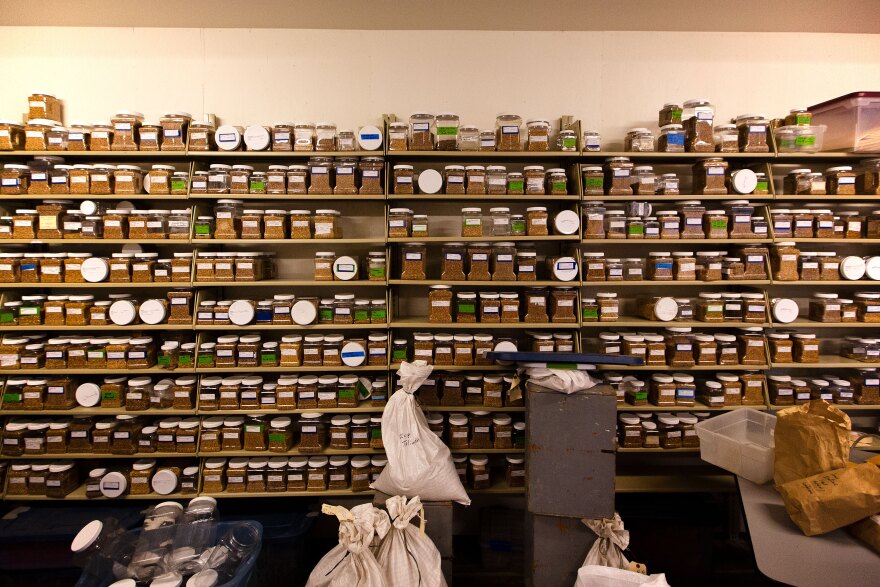For many, Skagit Valley is known for its annual Tulip Festival. And while the million-plus visitors who flock here every year is a remarkable part of the story, this area’s identity runs much deeper.
All Things Considered host Ed Ronco and producer Geoffrey Redick take listeners inside the heart and soul of Skagit, from farmers helping each other thrive to vital programs for marginalized populations.
:40 — First, we visit Bow Hill Blueberries, where Harley Soltes is hard at work juicing 180 pounds of thawed blueberries on his 5-acre farm. Most of the berries are frozen once they’re picked, a “value-added” approach, Soltes says. “And by freezing all the fruit first, it kind of ruptures the cell structure and helps release the juice the way we do it,” he said. The farm is one of the founding members of the Puget Sound Food Hub, a farmer-owned cooperative with the goal of selling good food at a price that will keep farmers in business.
7:22 — Skagit Valley needs new farmers. The number of farmers is decreasing, and statewide some 70 percent of farmers are expected to retire in the next 20 years or so. But becoming a farmer can be a huge undertaking. One way people learn is through a nonprofit group called Viva Farms.

They have locations in Skagit and King counties. Ed Ronco visited the farm and talked with executive director Michael Frazier and Mauricio Soto, a local farmer whose learned the ropes thanks to the program. “You improve every year,” Soto said. “It’s an education you get through life.”
12:05 — Next, Ed Ronco takes a walk through downtown Mount Vernon with Mayor Jill Boudreau. “I think I surprise people when I call them back or e-mail them back directly,” she says. “I like to be able to really talk to people.”
13:10 — It might surprise people to know that manufacturing is the top industry in Skagit Valley, given the large swaths of farmland. “I think that’s a common perception,” says John Sternlicht, CEO of the Economic Development Alliance of Skagit County. “I think there are even some people in Skagit County who might think first of agriculture and tulips when they think about us.” Ronco takes listeners to two advanced manufacturing businesses in the area.

20:08 — Next, KNKX Connects introduces listeners to Dr. Binay Shah. He’s an oncologist at PeaceHealth in Sedro-Woolley. But he’s also the founder of the Binaytara Foundation, which works to promote access to cancer care in Nepal and India, as well as health care reform in the United States. “We try to improve access to health care, access to cancer care, in the United States and in low-income countries such as Nepal and India,” Shah says.
23:14 — Now that we’ve heard about manufacturing and health care, KNKX Connects introduces listeners to a very specific type of research. Washington State University operates a lab in Burlington where you can eat the experiments. It’s called the Bread Lab, and it looks for ways to improve upon wheat. Food commentator Nancy Leson joined producer Geoffrey Redick on a visit to the facility.

32:10 — Then, we meet Matt Malyon, a chaplain and a writer who works with kids at the Skagit Valley Detention Center, as part of the program Underground Writing. Three and a half years after it first started, the program has grown into a podcast, a new book and workshops in five Skagit County locations.
39:50 — Finally, environment reporter Bellamy Pailthorp meets up with aerial photographer John Scurlock and geologist John Riedel, who have become friends as they’ve collaborated in documenting the effects of climate change on Washington’s glaciers.
47:03 — Finally, a few moments with nature, listening to a flock of trumpeter swans on Fir Island.

KNKX Connects to Skagit Valley was the fifth iteration of our regional remote broadcasts. So far, we've visited Port Angeles, the Centralia-Chehalis area, Bellingham and Grays Harbor County. Visit knkx.org/connects to hear all our stories.







